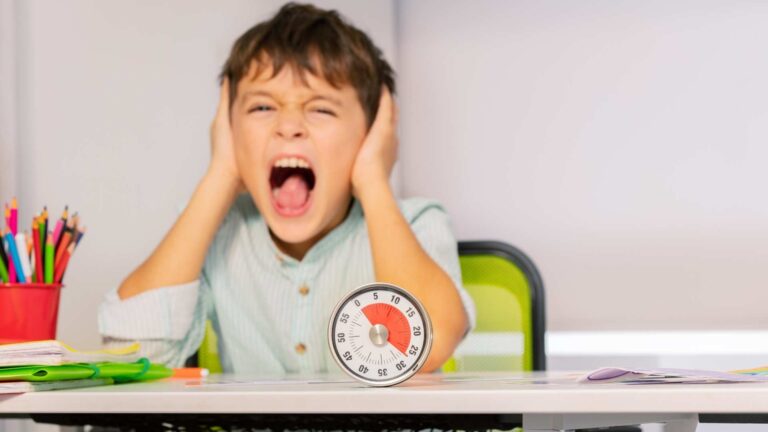Table of Contents
How Can I Help My Child with Autism Cope with Back-to-School Anxiety?
The start of a new school year often brings excitement and anticipation for many families. However, for parents and caregivers of children with autism spectrum disorder (ASD), the transition can feel overwhelming and filled with back-to-school anxiety.
Research from the National Autistic Society suggests that many neurodivergent individuals, both young and old, thrive on predictability and routine. This factor can make the adjustment from relaxing summer schedules to structured school days particularly tough for children on the autism spectrum.
Unlike neurotypical children who may also experience the first day-of-school jitters, children with ASD can demonstrate heightened responses to this anxiety that can be difficult for them and others to manage. Even minor adjustments like a different classroom layout or a varying lunch schedule can trigger significant anxiety in a person with autism.
If you’re wondering, “How can I help my child with autism cope with back-to-school anxiety?” you’re not alone. The key to a good start this school year for your child with autism lies in thoughtful preparation, understanding your child’s unique needs, and implementing evidence-based strategies, like ABA therapy.
So, keep reading this guide by ABA Centers of Connecticut and continue learning more about this valuable topic! Get your neurodivergent kiddo back to school ready with more confidence than the year before!
To learn more about ABA Centers of Connecticut, click here. To read our other blogs about neurodiversity and other related topics, visit us here.
Understanding Back-to-School Anxiety in Children with Autism
Children with autism often struggle with transitions because their brains process change differently. According to the Autism Research Institute, approximately 40% of children with ASD experience clinically elevated anxiety levels. Transitions are often their primary trigger.
Several other factors can contribute to back-to-school anxiety in autism. These include, but are not limited to:
- Sensory overload from crowded hallways, loud bells, and unfamiliar environments
- Communication struggles that make it difficult to express concerns or ask for help
- Social demands of navigating peer relationships and group activities
- Executive functioning difficulties organizing materials and following multi-step directions
The disruption of familiar summer routines and the introduction of new teachers, classmates, and expectations can feel overwhelming for children who rely on predictability to feel secure.
Recognizing the Signs of Back-to-School Anxiety
Every child expresses anxiety differently. Watch for these common signs in children with autism:
Behavioral Changes:
- Increased meltdowns or emotional outbursts
- Regression in previously learned skills (toileting, dressing, communication)
- Avoidance behaviors like refusing to discuss or attend school
- Repetitive questions about schedules or routines
Physical Symptoms:
- Sleep disturbances or changes in sleep patterns
- Appetite changes or digestive issues
- Headaches or stomachaches without a medical cause
- Increased stimming or self-soothing behaviors
Emotional Indicators:
- Heightened irritability or mood swings
- Increased clinginess or separation anxiety
- Expressions of worry about specific school situations
Early recognition of these signs allows parents and educators to provide targeted support before anxiety escalates.
6 Evidence-Based Strategies for Smooth School Transitions
1. Create Predictable Routines Early
Begin adjusting your child’s schedule 2-3 weeks before school starts. Gradually shift bedtime and wake-up times in 15-minute increments to match the school schedule. Practice morning routines, including:
- Getting dressed independently
- Eating breakfast at school time
- Packing backpacks
- Following visual schedules
Experts suggest consistent routines often reduce anxiety by providing a sense of control and predictability for children with autism.
2. Use Visual Supports and Social Stories
Create visual schedules and social stories that outline the school day step-by-step. It can be helpful to include:
- Photos of the school building, classroom, and key areas
- Pictures of teachers and support staff
- Visual representations of daily activities and transitions
- Expected behaviors in different settings
Research shows that visual supports can improve comprehension and reduce anxiety in children with autism.
3. Practice School Visits
Schedule visits to the school before the first day, when possible. Walk through the following routines:
- The drop-off and pick-up process
- The route from the entrance to the classroom
- Key locations like bathrooms, the cafeteria, and the library
- Meeting teachers and support staff
Familiarity with the physical environment can also help to reduce anxiety on the first day significantly.
4. Prepare Sensory Support Tools
Work with your child’s teacher to create a sensory toolkit that’s appropriate for your child to keep handy. It should include tools like:
- Noise-canceling headphones for loud environments
- Fidget tools for self-regulation
- A quiet space for breaks when needed
- Preferred comfort items (if school policy allows)
The American Journal of Occupational Therapy reports that sensory supports help many students with autism better regulate their emotions and attention.
5. Build Strong School Partnerships
Establish open communication with your child’s educational team by:
- Sharing detailed information about your child’s strengths, triggers, and successful strategies
- Reviewing and updating the IEP or 504 plan accommodations
- Scheduling regular check-ins with teachers
- Providing contact information for quick communication
For many, strong home-school collaborations also improve outcomes for students with autism, according to the National Library of Medicine.
6. Celebrate Small Victories
Acknowledge and celebrate every success, no matter how small:
- Getting ready for school on time
- Walking into the building independently
- Participating in one classroom activity
- Using appropriate communication strategies
Utilizing positive reinforcement in ABA therapy and across settings helps establish confidence and motivation for continuous progress. Over time, this helps to lessen worry around school experiences and create better days.
How ABA Therapy Supports School Success
Applied Behavior Analysis (ABA) therapy is an evidence-based approach that can significantly ease school transitions for children with autism. ABA therapy addresses key areas, including:
Social Communication Skills:
- Teaching appropriate ways to ask for help
- Practicing peer interactions and conversations
- Developing nonverbal communication skills
Adaptive Behaviors:
- Building independence in daily tasks
- Teaching problem-solving strategies
- Developing coping skills for challenging situations
Academic Readiness:
- Improving attention and focus
- Teaching following directions and classroom routines
- Building pre-academic and academic skills
Research shows that children receiving ABA therapy demonstrate significant improvements in school readiness and adaptive functioning.
Building Long-Term Success for Better Starts to Every School Year
Remember that successful school transitions take time and patience. Every child with autism is unique, and what works for one child may need adjustment for another. The key is consistent support, open communication, and the celebration of their progress.
Fortunately, with the proper preparation and support, your ASD child can approach the new school year with greater confidence and less anxiety.
The strategies outlined here, in combination with expert ABA programming, can help you create positive school experiences that set the foundation for lifelong learning and healthy personal growth.
Get Support for Back-to-School Anxiety from ABA Centers of Connecticut
At ABA Centers of Connecticut, we understand the unique challenges families face during school transitions. Our team of dedicated ABA experts, including Registered Behavior Technicians (RBTs) and Board Certified Behavior Analysts (BCBAs), provides comprehensive support, including autism screening, diagnosis, and individualized ABA therapy.
Whether you’re preparing for your child’s first school experience or navigating ongoing challenges, we’re here to help.
Contact us today to ensure your child starts the school year with confidence and support by calling (844) 395-0448 or visiting us here!
Together, we can make this school year a success story.









